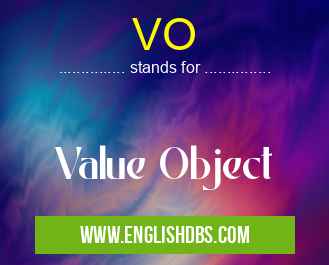What does VO mean in DATABASES
Value Objects (VO) are data objects that contain attribute values and related behavior. They play an important role in object-oriented programming as a means of encapsulating data and ensuring data integrity. Value Objects are typically used in Domain Driven Design to represent attributes of an entity, such as the name or address of a person.

VO meaning in Databases in Computing
VO mostly used in an acronym Databases in Category Computing that means Value Object
Shorthand: VO,
Full Form: Value Object
For more information of "Value Object", see the section below.
Benefits of Using Value Objects
Value Objects offer several advantages over other types of data classes. They can help make code more readable by making sure all relevant values are stored in one place rather than scattered throughout the codebase. Additionally, they ensure that all changes to their associated value are made through their own methods and functions, which makes debugging easier by providing a central point from which all changes can be monitored and tracked. Finally, Value Objects allow for easy validation on inputted values without requiring large amounts of additional code or processing power to do so.
Essential Questions and Answers on Value Object in "COMPUTING»DB"
What is a Value Object?
A Value Object is an object that holds values without any relevant identity. This type of object typically represents a set of properties with related data, and has no meaningful identity beyond its individual parts. For example, a person's address would be a value object with the parts being street number, street name, city, state and zip code.
What makes Value Objects different from Entities?
The main difference between an Entity and a Value Object is that the latter does not have any underlying identity. An Entity on the other hand tends to possess some underlying identity or meaning to it beyond its properties and values. For example, while an address might be a value object with its own properties, an account or customer would be considered an Entity and have additional meaning such as customer id or account status which provide it with more context than just its values alone.
What benefits do Value Objects provide?
There are several advantages to using Value Objects in your applications. First, they help keep code clean by reducing complexity and avoiding duplication of data by expressing all related data as one unit instead of multiple entities. Second, they can be used as powerful tools for representing various business rules in your application logic. Finally, they help reduce long method parameters lists since all related data can simply be passed together as one single piece rather than separate objects.
How do I decide when to use a Value Object?
Generally speaking you should consider using a Value Object when you find yourself repeating the same set of related data again and again throughout your application or when you find yourself writing complex methods where multiple parameters must be passed into it in order to perform its operation.
Does every entity need its own Value Object?
Not necessarily. It depends on how much importance is placed on identifying each individual value for the specific entity you are working with. If it doesn't really matter which property belongs to what entity then it may not be necessary to create separate value objects for each entity.
Is there any downside to using Value Objects?
The main downside to using value objects is that creating them takes extra time and effort upfront; however this extra effort helps pay off over time in terms of increased readability and maintainability of your codebase so it can often times be worth the investment initially.
When should I avoid using Value Objects?
You should avoid using Value Objects if your values are tied closely together or form part of their corresponding entities identity since this will make sense only if those values change together otherwise maintainability can become difficult due to inconsistency problems caused by attempting to update one value but leaving another behind.
Are there good coding practices when working with Values Objects?
Yes! Firstly try to carefully design each value object ensuring that all related information is included within it before writing any code around it - this helps keep code cleaner by avoiding repetition of data throughout disparate classes or functions Secondly always pass value objects directly instead of passing specific properties since this provides better encapsulation making sure individual properties cannot changed without the class itself being updated Thirdly update all dependent objects if required after updating any property within a value object for consistency reasons finally ensure your tests cover all validations surrounding these changes.
Final Words:
In summary, Value Objects provide developers with a convenient way to encapsulate attribute values and associated behavior within an object-oriented environment. They can improve readability, ensure data integrity, and enable straightforward validation processes without requiring significant additional effort from developers.
VO also stands for: |
|
| All stands for VO |
